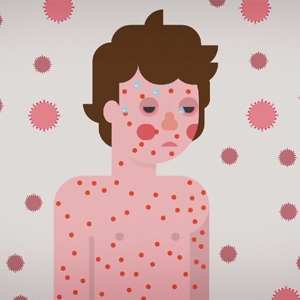
Insect bites and stings are common and, although bothersome, seldom have serious consequences. The severity of an insect bite varies from person to person. The type of reaction which occurs after an insect bite depends on the species of insect, the age of the person and whether or not the person has been exposed to the insect before.
Insects not only bite, but also cause irritation to the skin. Most reactions to insect bites depend on a reaction to the saliva or venom. Insect bites can be single or multiple, depending on the feeding habits of the insect concerned. For example, fleas may produce multiple bites while a mosquito may only bite once.
Most reactions cause a stinging sensation, redness, mild swelling, and some annoying itching confined to the sting site that disappear within a day or so. For some, especially in children, the swelling and redness may extend beyond the sting site, be more pronounced, and last two to three days.
A few people are allergic to insect bites and will experience itchy bumps, itching and swelling in other areas of the body. There might be tightness in the chest, difficulty breathing and swelling of the face and tongue. Only a small percentage of people develop an anaphylactic reaction which may be life-threatening.
Mosquito, bedbugs and flea bites are the most common insect bites. In certain areas, some mosquitoes can transmit malaria. Bee and wasp stings are common during summer but not usually dangerous unless the person is allergic to these insects or if they are stung in the mouth or throat. These stings cause a painful red bump or swelling.
Ticks are parasites that embed their heads in the skin to feed on the blood of mammals. They range in colour from brown to grey and are usually found in the veld and on domestic animals. Tick bites are more common during spring and summer. They seldom lead to serious problems but some ticks may transmit organisms which could lead to illnesses, such as tick bite fever.
Home treatment
- Itching can be relieved with an ice cube or cool compresses, a baking soda paste or bath, a meat tenderiser-water solution or soothing lotions such as calamine, Prep or witch hazel. 1% hydrocortisone cream is also effective.
- Take an oral antihistamine to reduce severe itching. Give paracetamol for pain.
- Remove a bee stinger by gently scraping the skin with the blunt edge of a knife, a credit card or with your fingernail. Try to do so within 30 seconds to avoid receiving more venom. Do not grasp the stinger as this could release more venom. If the stinger is below the skin surface, leave it alone and see a doctor. Do not rub the skin.
- Wash the bite area with soap and water.
- If you are severely allergic to bee or wasp stings, ask your doctor about an emergency kit containing an adrenaline syringe (Epipen), and try to avoid being outdoors. Wear a Medic Alert tag. An ice cube will also reduce blood flow.
- If you’ve been outdoors, check your whole body for ticks, especially hairy areas, skin clefts and crevices. If a tick is found, remove it immediately. Don't use bare fingers to remove the tick, but clutch it with fine-tipped tweezers as close to the skin as possible and pull it out in a straight line - don't jerk or twist it. Make sure that the head is also removed. If the head remains behind, it could cause a small necrotic ulcer ("veld sore"). Do not squeeze or crush the tick. Save the tick in a container in case you develop a tick-borne illness and tests need to be done. Wash your hands and the bite site. Apply an antiseptic cream.
Get help immediately if:
- you have a severe allergic reaction to an insect bite. Follow steps for allergic reactions on this site while you wait for help. Don’t wait for the reaction to occur if you have a history of previous severe reaction to the insect’s bite. Get to a hospital.
- you’ve been stung on your face or neck. It may cause rapid swelling which could obstruct the airway.
Call your doctor if:
- There are signs of infection
- There are multiple bites causing swelling around the eyes
- You develop urticaria (hives)
- If you have developed an allergy to an insect bite. Allergy desensitation treatment is highly effective.
- The whole tick could not be removed.
- You develop flu-like symptoms. See malaria and tick bite fever.
Prevention
- Use insect repellants, such as coils and sprays, containing 10% DEET to prevent mosquito and flea bites. They do not work against stinging insects. Ensure that there is no stagnant water on your property.
- Sleep under a mosquito net with a fan next to you and wear protective clothing after dusk.
- Make sure that the household pets are free of fleas by regular use of anti-flea preparations. If fleas are obviously infesting the house then fumigation may be needed.
- Stay out of the “territory” of stinging insects’nests. If you encounter any flying stinging insects, stay calm and move away from them slowly. Do not swat at it; rather, gently brush it aside.
- Many insects are attracted by flower smells, so avoid perfume when outdoors. Wear white clothing if you are visiting an area where bees are common. Wear closed-toe shoes outdoors and don’t go barefoot.
- Keep food covered when eating or drinking outdoors. Remember that stinging insects crawl into open cool drink cans.
Read more:




 Publications
Publications
 Partners
Partners










